Схожі новини
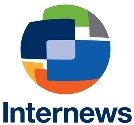 Internews’ annual media consumption survey shows a dramatic drop in Ukrainians’ use of Russian media. The survey shows that Russian TV viewership shrank to 8% from 27% in 2014, and Russian internet use slid to 27% in 2015 from 44% in 2014. While lower consumption rates for Russian TV might be partially explained by the Ukrainian government’s initiative to ban transmissions of Russian TV signals within the country, internet access has not been restricted.
Internews’ annual media consumption survey shows a dramatic drop in Ukrainians’ use of Russian media. The survey shows that Russian TV viewership shrank to 8% from 27% in 2014, and Russian internet use slid to 27% in 2015 from 44% in 2014. While lower consumption rates for Russian TV might be partially explained by the Ukrainian government’s initiative to ban transmissions of Russian TV signals within the country, internet access has not been restricted.
 Internews commissioned a qualitative research on implementation of media literacy course in secondary schools of Ukraine. The study held in March-April 2015, aimed surveying teachers and students at root level to understand barriers and prospective in applying media literacy course at practice.
Internews commissioned a qualitative research on implementation of media literacy course in secondary schools of Ukraine. The study held in March-April 2015, aimed surveying teachers and students at root level to understand barriers and prospective in applying media literacy course at practice.
Conducted in cooperation with European Research Association (ERA), the research revealed that media education in secondary schools is implemented through successful combination of efforts of Academy of Ukrainian Press that trained OIPE coordinators/teachers at its schools and the Institute for Social and Political Psychology of National Academy for Pedagogical Sciences that developed the national experiment for 80 schools of 10 oblasts of Ukraine.
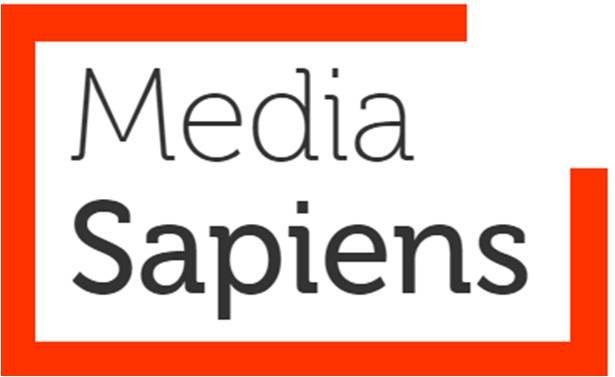 Telekritia published English translation of its survey of media consumers in eastern and southern regions of Ukraine. The survey conducted by Kyiv International Institute of Sociology (KIIS) aimed analyzing an influence of Russian propaganda on eastern regions of Ukraine including occupied areas. Researchers also asked about people's perception of political situation in Ukraine. The Telekritika/KIIS survey was supported by the Department for Rights and Labour (DRL) of US Department of State through Internews Network.
Telekritia published English translation of its survey of media consumers in eastern and southern regions of Ukraine. The survey conducted by Kyiv International Institute of Sociology (KIIS) aimed analyzing an influence of Russian propaganda on eastern regions of Ukraine including occupied areas. Researchers also asked about people's perception of political situation in Ukraine. The Telekritika/KIIS survey was supported by the Department for Rights and Labour (DRL) of US Department of State through Internews Network.

Internews published needs assessment report “UNDERSTANDING INFORMATION AND COMMUNICATION NEEDS AMONG IDPs IN EASTERN UKRAINE that resulted from the 2-week trip of Internews Senior Humanitarian Advisor Jacobo Quintanilla and Internews Ukraine project manager Vitali Moroz to the East of Ukraine. From January 20-30, 2015, an Internews assessment team carried out a rapid assessment with displaced populations and host communities in eastern Ukraine to understand their information needs and access to communication channels.
 August 2014 - Internews publisized an online survey of Ukrainian journalists to study journalists’ conception of standards of journalism, interaction with media audience, journalists’ perception of condition of freedom of speech, external and internal factors, that have an influence on quality of journalists’ work and implementation of their role in society, including labor relations, level of job compensation, ethical principles of journalism, level of journalists’ professional knowledge and knowledge of media legislation concerning access to public information, defamation, handling with personal data etc.
August 2014 - Internews publisized an online survey of Ukrainian journalists to study journalists’ conception of standards of journalism, interaction with media audience, journalists’ perception of condition of freedom of speech, external and internal factors, that have an influence on quality of journalists’ work and implementation of their role in society, including labor relations, level of job compensation, ethical principles of journalism, level of journalists’ professional knowledge and knowledge of media legislation concerning access to public information, defamation, handling with personal data etc.
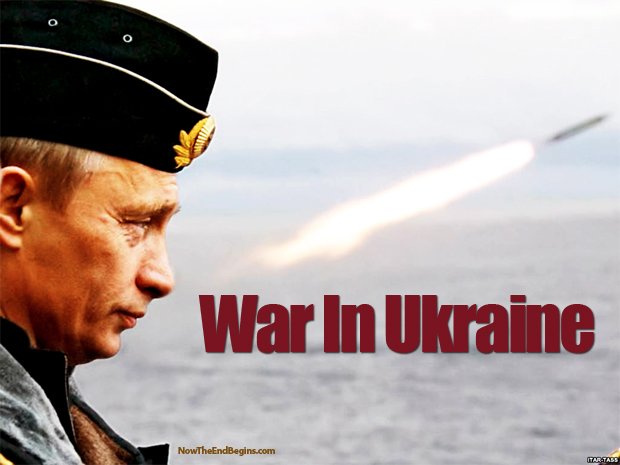 MediaSapiens translated analytical overview about Russian media coverage of war conflict in Eastern Ukraine. Read about lie and falsifications in Russian news spread through TV channels and online media. Photo credit: http://www.nowtheendbegins.com
MediaSapiens translated analytical overview about Russian media coverage of war conflict in Eastern Ukraine. Read about lie and falsifications in Russian news spread through TV channels and online media. Photo credit: http://www.nowtheendbegins.com
 New research reveals that a clear majority of Ukrainians in Donetsk oblast (region) are watching both Ukrainian and Russian TV news, although trust levels of the population in Ukrainian TV is low. . Around the rest of the country, people prefer to get their news from Ukrainian TV channels. The survey in 10 regions of Ukraine was commissioned by Internews and conducted from April to June 2014 by marketing and research firm InMind for the USAID-funded Ukraine Media Project (U-Media).
New research reveals that a clear majority of Ukrainians in Donetsk oblast (region) are watching both Ukrainian and Russian TV news, although trust levels of the population in Ukrainian TV is low. . Around the rest of the country, people prefer to get their news from Ukrainian TV channels. The survey in 10 regions of Ukraine was commissioned by Internews and conducted from April to June 2014 by marketing and research firm InMind for the USAID-funded Ukraine Media Project (U-Media).
 The Internews is seeking a Content Analysis Expert /Expert Group to assist in implementation of a three-year project Strengthening Investigative Reporting in Ukraine (SIRU). The Content Analysis Expert /Expert Group will analyze the quality of investigative reports produced by Internews implementing partners and provide recommendations on quality improvement.
The Internews is seeking a Content Analysis Expert /Expert Group to assist in implementation of a three-year project Strengthening Investigative Reporting in Ukraine (SIRU). The Content Analysis Expert /Expert Group will analyze the quality of investigative reports produced by Internews implementing partners and provide recommendations on quality improvement.
- У-Медіа » English » Media Research » 92% of media literacy teachers in Ukraine use resources developed by Internews partnering NGO
- Переглядів: 864
- Автор: rfgtw
- Дата: 6-07-2015
92% of media literacy teachers in Ukraine use resources developed by Internews partnering NGO
Категорія: English » Media Research
Promo Release
Internews commissioned a qualitative research on implementation of media literacy course in secondary schools of Ukraine. The study held in March-April 2015, aimed surveying teachers and students at root level to understand barriers and prospective in applying media literacy course at practice.
Conducted in cooperation with European Research Association (ERA), the research revealed that media education in secondary schools is implemented through successful combination of efforts of Academy of Ukrainian Press that trained OIPE coordinators/teachers at its schools and the Institute for Social and Political Psychology of National Academy for Pedagogical Sciences that developed the national experiment for 80 schools of 10 oblasts of Ukraine.
84% of surveyed teachers, who themselves teach media literacy, went through trainings for trainers, while 16% started teaching independently. Every fourth respondent out of 90 took part in AUP media literacy schools; another 28% took part in OIPE seminars. Thus, the twofold approach of OIPE courses and AUP schools proved to be quite effective.
Some schools (about 16%) went beyond the national and regional experiments by starting independent implementation of ME for their students. However, to ensure a full transition from the experimental stage to wide implementation, ME courses should be included into university “the must” curricula of pedagogical colleges and universities.
ML teaching methods
Secondary schools use different approaches to ME implementation: some focus on psychological aspects of ME i.e. critical thinking, while others focus on its practical aspects—production of media content. The schools can choose its own approach depending on available sources and lessons’ plan.
One of the most interesting experiences --integration of ME elements into various subjects throughout all school grades, involvement of older pupils in mentoring younger ones. During classes, teachers focus on the development of critical and creative thinking, cyber security is secondary.
Teachers use existing textbooks creatively, select topics of interest/accessible to students that can be presented depending on available technical resources and teacher’s specialization. 83 out of 90 surveyed teachers (92%) use resources at AUP site http://medialiteracy.org.ua for ML educators. Most popular are presentations and model lessons. Further development of the database of model lessons, updates of video library can become a useful resource to ME teachers.
Surveyed teachers turned out to be quite creative. They not only teach ME/ML in their respective schools (90 persons), yet a third also teaches ME/ML as an extracurricular activity. 26 teachers do their own scientific research on the topic, 26 develop and work in school media. Several teachers began to develop own course outline and became heads of clubs.
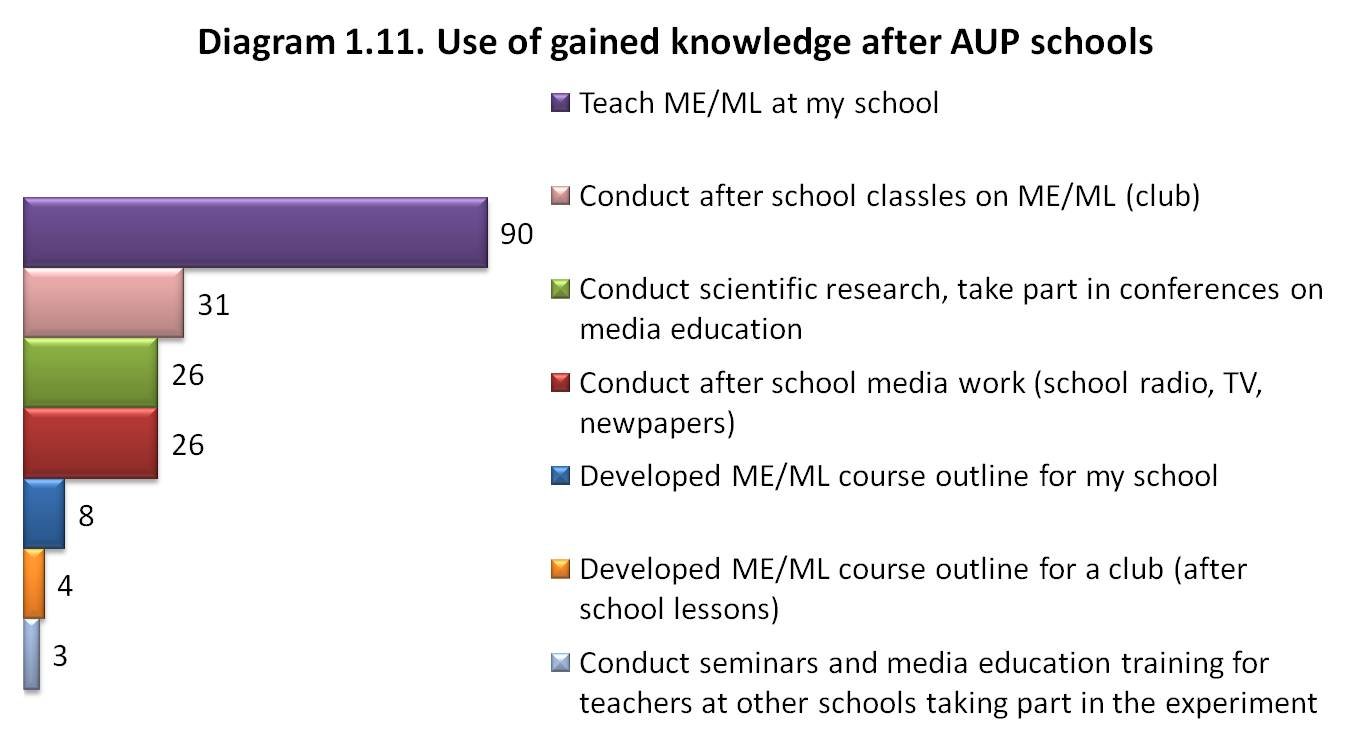
Students
In accordance to the concept and curriculum, 10th graders constitute the largest group among ME students. Students from other grades are involved in clubs and optional courses.
Pupils divided into two groups – whose who study ME education as a part of mandatory courses and who participate media clubs – view ME’s objectives and practical usefulness differently. Pupils studying ME in mandatory classes and elective courses see the value in critical approach to processing and assessment of information. Pupils studying ME in clubs, see the latter as means to widening their network of friends, socializing, and gaining tech knowledge in media production. It is important to preserve the balance between the two existing approaches and emphasize main principles of ME– critical thinking, ability to discern bias etc. into the work of media clubs.
Some pupils do not know whether media education helped them to view documentaries and movies critically. Researchers deduce that theoretical knowledge is not always transferrable into practical skills. ME courses should focus more on developing pupils’ skills for critical viewing of documentaries and films.
On pupils’ opinion, the media education is necessary for parents as well. Children think poorly of their parents’ level of media literacy and try to “educate” their parents with knowledge from media literacy courses. Moreover, schools started using various approaches towards parent “enlightenment” as well.
Teacher needs
Teachers lack intensive experience sharing opportunities with their colleagues from different regions. Teachers who already develop own programs and conducted research should be encouraged to continue strengthening practical aspects of ME and improve ME course materials. Their efforts will result in an improved accessibility of the course to pupils.
Majority of experts envision further media education development via its integration into various disciplines. Teachers specializing in various subjects (math, biology, IT etc.) became involved in ME course implementation, thus it may be possible to develop teaching materials on ME that will be integrated into various disciplines/school subjects.
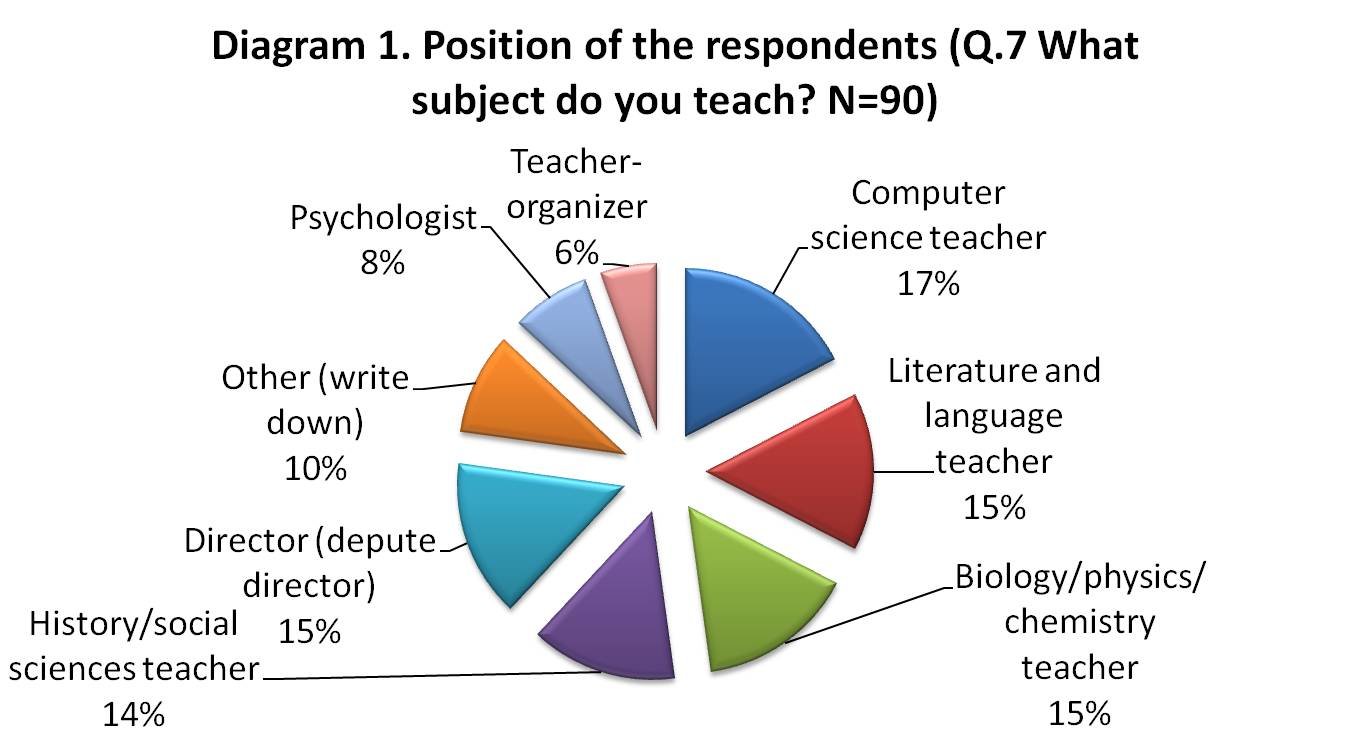
Respondents agree that primary and middle school pupils need media education on par with high school pupils.
Substantial need for teachers’ manuals on practical assignments and media library. There is a lack of available tests and instruments to assess gained knowledge.
me-in-schools_-report_may5_2015_eng.pdf [1,84 Mb] (cкачиваний: 6)" target="_blank">PLEASE READ THE FULL REPORT ONLINE IN ENGLISH
me-in-schools_-report_may5_2015_ukr.pdf [1,43 Mb] (cкачиваний: 2)" target="_blank">REPORT IN UKRAINIAN ONLINE
Background info:
From 2012 till now, the Academy of Ukrainian Press (AUP) built a solid methodological background for media literacy teaching of pupils of different ages. Considering the absence of textbooks and curricula designed for children, the Academy taught teachers, conducted scientific and practical conferences on practical media literacy, developed programs and teaching methodologies, and printed handbooks. In particular, AUP developed and published the following materials for teachers and students:
- The first licensed by MES textbook for pedagogical universities “Media Education and Media Literacy” was published three times a total circulation of 3,000 copies. http://www.aup.com.ua/uploads/mo3.pdf ;
- Two American textbooks on media literacy teaching were translated and now they available online for teachers and students: L. Scheibe, Faith Rogow “The Teacher's Guide to Media Literacy: Critical Thinking in a Multimedia World” and Teacher's Guide “Press Ahead!" Newspaper Association of America. The first tutorial is quite common among media literacy teachers;
- A wide range of curricula as a basis for media literacy teaching in secondary schools, pedagogical colleges and pedagogical universities was created and approved:
- 2-4 grades - http://www.aup.com.ua/ml/progr_2_4.pdf;
- 8 grade - http://www.slideshare.net/slideshow/embed_code/28897896,
- 10-11 grades - http://www.aup.com.ua/ml/Program_10_11.pdf;
- Pedagogical colleges - http://www.aup.com.ua/ml/Prog_kolleg_.pdf;
- Pedagogical universities - http://aup.com.ua/uploads/Program_for_student.pdf;
- A book of authors’ lessons on media literacy “Practical media education: author lessons” was created for teachers for developing their own lesson planshttp://aup.com.ua/uploads/lessons-5.pdf;
- The first teaching guide for teachers “Fundamentals of media literacy 8 (9) Grades: Lessons curricula” captured all the topics to be taught for mid-school students http://bit.ly/1yvmSp7;
- The interactive training module for teachers of secondary schools “How to develop a modern school newspaper” was issued in three languages (Ukrainian, Russian and Belorussian) and delivered at in-depth ML trainings for teachers in the regions (http://www.aup.com.ua/uploads/modul.pdf);
- The web portal “Media Education and Media Literacy” http://www.medialiteracy.org.ua provided methodological materials, books, video and presentations for media educators;
- With the support of the MyMedia project, AUP managed bringing together 14 young reporters from 11 to 19 years old to create youth newspapers with circulation of 20 thousand copies. The first two issues of the newspaper “Your Choice # FreedomUkraine” were distributed along with regional newspapers in all regions of Ukraine, (http://www.aup.com.ua/ml/Tvoy_vybor_1.pdf, http://www.aup.com.ua/ml/Tvoy_vybor_2.pdf);
- AUP translated and adapted for Ukraine an online game “Mediaznayko” for children; the game was created by an Internews project in Armenia called “Center of Media Initiatives”. The game provides knowledge about interesting facts of development of media in the world, its role in the society and develops the children’s skills in journalism (http://www.aup.com.ua/Game/index.html).

